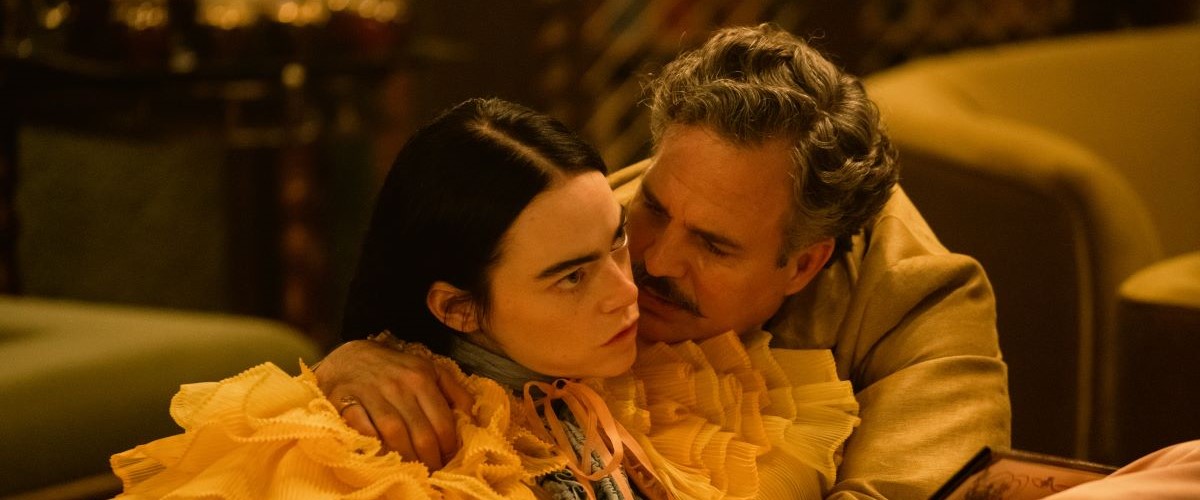
Poor Things is a steampunk, quasi-feminist reimagining of the Frankenstein story—an overstuffed odyssey that takes us from a mad scientist’s gothic lab to the streets of Lisbon and Paris, to a brothel, a luxury cruise ship, and beyond. And yet, in a strange way, it is one of Greek director Yorgos Lanthimos’ most conventional films.
I say this with a slight bit of disappointment. I liked Poor Things—especially the super game lead performances from Emma Stone and Mark Ruffalo. And I enjoyed the film overall—I’m recommending it. But I really wanted it to have a little more madness, a few more things that made me recoil, provoked me, shocked me, especially from the director who gave us the unsettling Dogtooth and The Lobster. Somehow, despite the wild-eyed and rococo premise, the film is a bit…decorous.
Let’s start with Willem Dafoe as that mad scientist. He is disfigured—because his own mad scientist father experimented on him when he was a boy—but just enough so that you take in his appearance, acknowledge the ungainly flaps of skin on his face, and move on. Now, there is at least something grotesque about him—because his innards were also experimented on, he can’t properly digest and needs a contraption to expel nearly solid burp bubbles whenever he eats. That’s the kind of bonkers imagination I was looking for throughout. It comes infrequently.
The film starts with an image of a pregnant woman about to hurl herself off the London Bridge. Then we cut to that same woman, the now gloriously named Bella Baxter (Emma Stone), no longer pregnant but with the mind and physical aspect of a baby. Yes, Dafoe’s Dr. Godwin Baxter has taken the dead woman’s body and implanted her fetus’ brain in her. Now, he will see what becomes of her and raise her like a kind of twisted father, of sorts, in a house filled with cadavers, mutant animals (a duck with the head of a French bulldog a goat with a duck’s head, etc.), and one forbidding housekeeper. Eventually, he will be joined by an earnest medical student, Max McCandles (Ramy Youssef), hired to chart Bella’s progress, who is devoted to both the scientist and his subject.
Stone is, indeed, incredible as Bella—it’s a performance that requires all the acting chops: physical comedy, as she stomps around like a drunken toddler; uncommon grace, as she contorts her adult-sized body into childlike shapes and positions; emotional depth, as Bella becomes more and more curious and cynical about the world; and carnal fearlessness, as she explores Bella’s mounting lust.
Inevitably, Bella wants to get out of that house. It starts when she goes on the roof and sees a vast world out there. Then, reluctantly, Godwin allows her to ride in a (closed) carriage and enjoy a remote lakeside picnic. Max becomes even more devoted to her—he’s falling in love. (A credit to Youssef, in a tricky role, that Max comes across as kindhearted, not predatory.) Godwin proposes that Max and Bella get engaged, which they do.
Her ultimate ticket to freedom comes in an unlikely form: A caddish lawyer named Duncan Wedderburn (Ruffalo), who’s a rake, a lothario, and a bit of a dandy. He seduces Bella, easily—she has discovered touching herself and is now super excited about sex—and they run away together.
When Bella has her first orgasm with him, the film turns from black-and-white to color. (I won’t dwell on this, but this “feminist” fantasy—written and directed by men—tells on itself a bit when it takes a man to achieve this feat.) The peripatetic Duncan expects to have some sex with Bella, turn her onto a few of life’s worldly pleasures, and be done with her—but there’s a bit of a role reversal. He becomes obsessed, besotted, and doesn’t know what to do with himself. It’s great fun watching Ruffalo, who we are used to seeing in naturalistic roles, take on this preening narcissist. Duncan can’t quite figure out whom he’s angrier at—Bella, for enrapturing him, or himself for allowing it to happen.
In one of the film’s best sequences, Bella and Duncan end up on a cruise liner (he’s trying to kidnap her, essentially), where she meets a wizened grand dame (Hanna Schygulla) and her jaded young companion. The grand dame loves Bella’s insatiable nature, her lust for life—but her young companion (Jerrod Carmichael) is threatened by it and tries to corrupt her. It’s an intriguing sequence, seeing these various responses to Bella, and a bit too short in my estimation—but this is what happens, I suppose, when you turn a 336 page book into a two-hour movie.
The next bit involves Bella earning her way at a brothel—she does is partly because she likes sex and partly because she needs the money. Either way, this is another example of the film’s questionable feminist bona fides, but it does allow for another great performance: Kathryn Hunter as the rapacious madam who can’t decide if she wants to seduce, exploit, or devour Bella.
The less said about the final act—involving Christopher Abbott as the husband of Bella’s late “mother” coming to claim her—the better. It feels unnecessarily on the nose—and a bit dreary after all the romping.
All in all, Poor Things is a fun, occasionally bewitching diversion, with a pair of truly remarkable lead performances. I just wish it had gone further. Watching it, I felt a bit like Bella—intrigued, amused, but ready move onto my next adventure.
